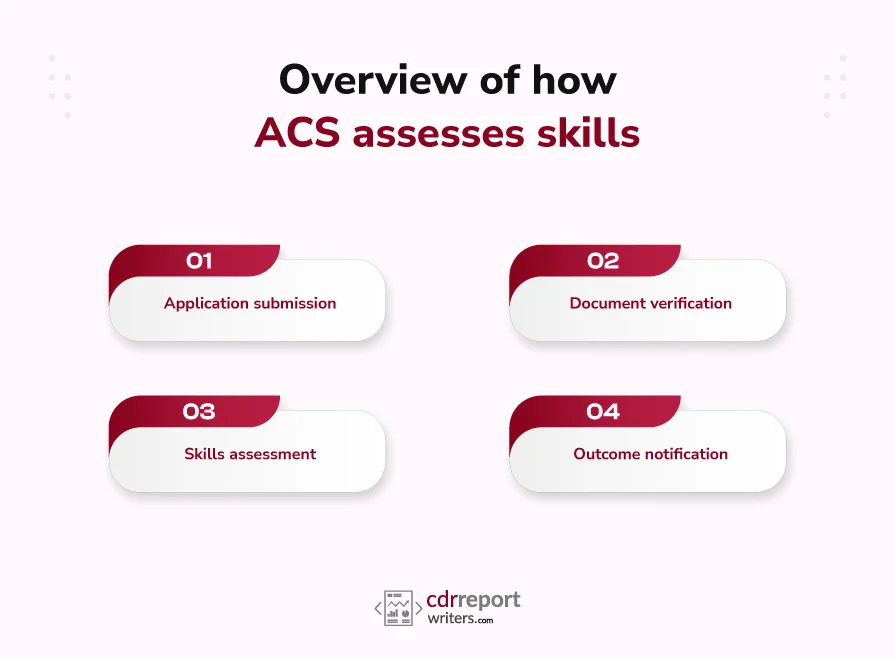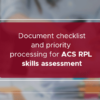
Statutory Declarations and Affidavits in ACS Skill Assessment
Getting a job in Australia involves an important assessment called the ACS (Australian Computer Society) skill assessment. This step evaluates your education and experience to see if you’re suitable for a job or career progress in Australia. A vital part of this assessment is to provide documents that show your qualifications. Among these documents, statutory declarations and affidavits are significant.
A Statutory Declaration, or Affidavit, is like a work reference letter but in legal statement form. ACS RPL Skills Assessment needs an affidavit when you can’t get a reference letter from your job. You can give a reference letter, but if you can’t, you need to explain the reasons in your statement. A particular person, like a notary, has to sign your statement. It also needs a date and place where this person signed it.
This blog is here to make it easy to understand statutory declarations and affidavits in the ACS skill assessment context. We’ll explain why they matter and how they’re different and give you step-by-step instructions on how to make them right. Knowing about these documents is crucial for a smooth assessment and a better chance of success.
What does the ACS Skill Assessment process involve?
Overview of how ACS assesses skills
The ACS skill assessment is like a key to working in Australia. It’s a detailed look at your qualifications and work experience, and it’s essential if you want to move there for work or career growth. The process involves four key stages:

1. Application submission:
You must send your application and essential papers like transcripts, work references, etc.
2. Document verification:
The ACS verifies your papers to ensure they’re real and needed for your application. This stage is essential because it shows how good and credible your application is.
3. Skills assessment:
The ACS conducts an assessment of your qualifications and work history. They make sure they’re real and needed for your application. This stage shows how it affects how relevant your application is to your nominated occupation.
4. Outcome notification
After the assessment, they tell you if you can move to Australia for work or if they recognize you as a professional there.
Learn More: Can an Engineering technologist get a PR Visa? ⏱⌛️
Importance of Accurate Supporting Documents
The most important part of the ACS skill assessment is the documentation you provide. These papers are not just pieces of paper; they show how trustworthy and qualified you are. Let’s talk about why these documents are essential:
- Trustworthiness: If your papers are correct, it shows you’re dependable, and it makes your application stronger for the ACS.
- Eligibility: The ACS needs these papers to decide if your qualifications and work history are right. If some mistakes or things need to be added up, it can slow down the assessment.
- Accuracy of the assessment: Papers about your skills and knowledge make the assessment more accurate. The ACS looks at these papers to see if you’re a good fit for moving to Australia or growing your career there.
If you check and send the proper papers, you follow the ACS rules. Following the correct guidelines helps ensure your application is turned on.
- Thoroughness: Ensure you include all the essential papers like school records, work references, and certificates.
- Accuracy: Double-check the information in the documents to prevent any discrepancies or errors.
- Relevance: Include papers that match what the ACS is looking for in your chosen occupation and experience.
Understanding Statutory Declarations in ACS Skill Assessment
Why do we use Statutory Declarations for immigration and jobs?
Statutory declarations are essential for immigration and job applications. This declaration is especially true when dealing with the ACS skill assessment. But what are these declarations, and why do they matter so much?
In simple terms, a statutory declaration is like an official paper that helps with immigration and job applications. The ACS skill assessment is a way to talk about your past jobs, what you did, and your skills in the ICT field. This paper checks your work experience and makes sure it follows ACS rules.
Statutory declarations come in handy in situations where you can’t get a reference letter from your previous employer. They help you prepare letters meeting the ACS requirements. In these cases, statutory declarations are an alternative way to prove your skills and abilities in a way that’s accepted. This document helps the ACS decide your eligibility for moving to Australia or working in the ICT industry there.
Differences from Other Statements:
What sets statutory declarations apart from other written statements? The key distinction lies in their specific legal significance and requirements. To create a statutory declaration, you need to promise that the information in it is true and correct.
Now, compared to a work reference letter from your boss, a statutory declaration is something you write about yourself. It lets you show your skills, job experience, and essential details without needing someone else. This difference makes a statutory declaration a more direct and personal way to talk about your abilities and expertise.
Learn More: How effectively write and lodge an Expression of Interest (EOI)? 🧑🏽✈️🏆
Common Situations Where Statutory Declarations are Useful
Statutory declarations are essential, especially in the ACS skill assessment.
- Lack of Employment Reference Letter:
Sometimes, you can’t get a work reference letter because of problems like the company closing or other issues. In these cases, you can use a statutory declaration to show that you did work there.
- Not Enough in the Reference Letter
Sometimes, you get a work reference letter, but it needs more than the ACS needs. It needs more information or needs the company’s official letterhead. In these situations, a statutory declaration can help by providing more proof to meet the assessment rules.
- Self-Employed or Independent Contractors
If you work for yourself or as a contractor, it takes a lot of work to get a formal work reference letter. In these situations, a statutory declaration is an excellent way to show your skills and experience.
Role of Affidavits in ACS Skill Assessment
Why are Affidavits important in the ACS Skill Assessment?
Affidavits are legal binding papers in the ACS skill assessment. They provide substantial proof for applicants. Affidavits matter a lot when you need to show exceptional skills, experience in unique jobs, or work done in particular situations. They’re like a way that the law accepts to prove these things, making your ACS skill assessment application stronger.
Instances where you need an Affidavit for specific claims
You might need an affidavit when you have to prove specific things as part of the ACS skill assessment. Let’s say you did different kinds of work, like freelancing or contracting. An affidavit can show what you did, your job tasks, and your accomplishments in those specific work situations.
Also, if you’ve needed help getting reference letters from your past jobs, an affidavit can be another way to show your skills and experience. And if you need to explain gaps in your job history or fix mistakes, an affidavit can give a clear and valid explanation.
Contrasting Statutory Declarations and Affidavits
Statutory declarations and affidavits have distinct features that set them apart. Affidavits are formal and require special promises like oaths and notarization. Statutory declarations are more straightforward and can replace documents like work reference letters. To decide which to use, follow the ACS rules for the skill assessment.
Learn More: How to Write an ACS RPL Report for Database Administrator? ✈️✈️
How to make Statutory Declarations and Affidavits for the ACS Skill Assessment?
Step-by-Step Guide for Creating a Statutory Declaration
Creating a valid statutory declaration requires a systematic approach.
To make sure your statutory declaration is correct for the ACS and is trustworthy, follow these step-by-step instructions:
- Introduce Yourself: Start with your full name, contact details, and the identification numbers the ACS needs.
- Provide Personal Information: Include your birthdate, where you’re from, and where you live now.
- Outline Your Employment History: Include details about your past jobs, including the company name, job title, how long you worked there, and what you did in each job.
- Highlight Relevant Qualifications: Mention any degrees, certificates, or other qualifications you have. This information shows your skills and knowledge in the job you want. Highlight any degrees, certifications, or educational achievements relevant to your nominated occupation.
- Explain Gaps in Employment: If your employment history contains gaps, provide a clear and honest explanation for each gap.
- Include Supporting Evidence: You can include extra papers like pay stubs, tax records, or bank statements that prove your job and work experience. These documents can further enhance the credibility of your statutory declaration.
Tips for making an accurate and complete Declaration according to ACS Rules
To make a statutory declaration that’s right for the ACS, pay attention to details and follow these tips:
- Review ACS Guidelines: Understand what the ACS needs for the skill assessment.
- Check Everything: Make sure your personal info, job history, and qualifications are correct and up-to-date.
- Be Clear and Detailed: Share enough details about your skills and experience, but make it brief.
- Seek Professional Help: If you’re unsure, ask a professional like an immigration consultant or a lawyer who knows ACS rules.
By doing this, you can create an excellent statutory declaration that follows ACS guidelines.
Crafting an Effective Affidavit for ACS Skill Assessment
When to use an Affidavit?
While statutory declarations are helpful in many situations, sometimes it’s better to use an affidavit. Here’s when you should use an affidavit:
- Sworn Evidence
If you need to give official, sworn proof of your work experience or skills, use an affidavit. It has legal weight and makes your application stronger.
- Unique Situations
Suppose your work experience is remarkable. For example, if you’ve done unique projects or worked in uncommon areas, In these cases, an affidavit can help prove your point.
- Notarization or Sworn Oath
Sometimes, you might be asked for notarization or a sworn promise. If the ACS or your situation needs this formality, use an affidavit.
Learn More: Help prepare the RPL report for the ACS skills assessment. ⏱⌛️
Legal Must-Haves for an Affidavit
Crafting a persuasive affidavit requires adhering to specific legal requirements and formatting. An affidavit should include the following elements:
- Heading
Start the document with a clear title that says it’s an affidavit. It usually includes your name, where you’re signing it, and the date.
- Truth Statement
In your affidavit, you should have a section where you promise that everything in it is accurate, and if it’s not, you could get in trouble with the law.
- Your Signature
You, the person applying, must sign the affidavit before someone important, like a notary public or a judge. This signature shows that you’re saying everything in the document is authentic.
- Witness’s Signature
The vital person, like a notary public or a judge, must also sign the affidavit.
Numbered Paragraphs: To make it clear and easy to refer to, number the paragraphs in your affidavit.
Guidelines for a Persuasive Affidavit
To make a good affidavit for your ACS skill assessment, follow these steps:
- Clear introduction: Start by introducing yourself and explaining what the affidavit is about.
- Present facts and evidence: Arrange your facts, experiences, and evidence logically. Use headings or subheadings if necessary to enhance readability.
- Conciseness: While including comprehensive information is crucial, avoid unnecessary elaboration or irrelevant details. Stay focused on the specific claims and experiences you are addressing.
- Professional tone: Maintain a professional and goal-based tone throughout the affidavit. Avoid subjective language, personal opinions, or emotional content.
- Seek legal advice if needed. Crafting a binding document can be complex. If you’re unsure about making an affidavit, it’s a good idea to get help from a legal expert, like a lawyer who knows about immigration.
Learn More: Australian Visa Options for Qualified Electrical Engineers. 🧑🏽✈️🏆
Avoiding Common Mistakes with Statutory Declarations and Affidavits
Ensuring a seamless and error-free ACS skill assessment is essential.
So, it’s essential to know the usual mistakes people can make with statutory declarations and affidavits.
Avoiding these pitfalls can improve your chances of a successful assessment.
- Incomplete or inaccurate information:
The most common error is when you give information in your statutory declarations and affidavits that needs to be completed or corrected. This error can lead to discrepancies, credibility issues, and potential application rejection. Make sure that all details are valid and up-to-date.
- Choosing the Wrong Document:
Choosing the wrong document, like statutory declarations and affidavits, is another common mistake. It would help if you considered your situation and what the ACS needs to decide which document is suitable.
- Using Unqualified Witnesses
When you make an affidavit, it’s vital to have an authorized person there when you sign it. Using an unqualified or unauthorized individual as a witness can render your affidavit invalid.
- Missed Signatures
If you need to remember to sign your document or have the authorized person sign it, they might think it’s not finished and won’t accept it.
- Non-compliance with ACS Guidelines
Following the ACS rules for statutory declarations and affidavits is a big mistake. Always review the latest guidelines and make sure your documents align with them.
- Inconsistencies
Inconsistencies between your statutory declaration, affidavit, and other documents can raise red flags during the assessment process. Ensure that all information and claims are consistent across all submitted materials.
- Lack of Clarity
If your statutory declarations and affidavits are confusing, it can cause problems. The people reviewing it might need help understanding your work experience and qualifications. Keep your language clear, concise, and to the point.
- Late Submission
If you complete the deadlines or give documents after the time they ask, it can speed up the assessment. Always stick to the timelines set by the ACS. Always adhere to submission timelines set by the ACS.
By not making these usual mistakes, you can make your statutory declarations and affidavits better.
Learn More: How to prepare CPD for your CDR Report? 🧑🏽✈️🏆
Conclusion
Statutory declarations and affidavits are essential in the ACS skill assessment. They’re not pieces of paper; they make your application stronger. These documents are not part of a process; they show your dedication to being truthful and honest during the assessment.
In conclusion, to succeed in your ACS skill assessment, it’s vital to make your statements clear and accurate. Follow the guidelines in this blog to enhance your chances of success.
Check the ACS rules and seek professional help for your Statutory Declarations and Affidavits. If you need help with documents like CDR reports, RPL reports, employment reference letters, or similar materials, don’t hesitate to get in touch with us for expert advice and support.





